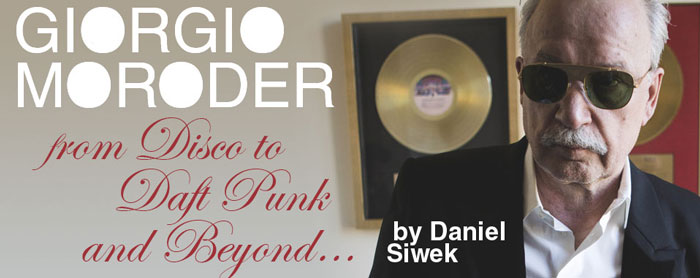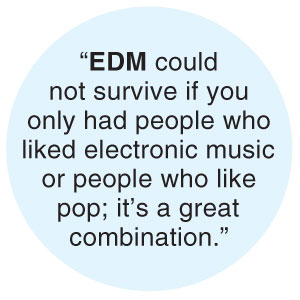
HIS SIGNATURE, that famously sequenced synthesizer over a four-on-the-floor beat (on Donna Summer’s smash single “I Feel Love,” the album From Here To Eternity and “The Chase” theme from the Oscar-winning Midnight Express soundtrack), is fundamental to electronic dance music the way a James Brown sample is to hip-hop. But wait—this Italian-born producer is a go-to sample source in hip-hop as well. In rock and pop, his collaborations with Blondie, Bowie and Cher and soundtracks for Flashdance, Scarface and Top Gun (for starters) helped define the sound of the ‘80s. But aside from a Grammy-winning reunion with Summer in the ‘90s, Moroder has until recently been in semi-retirement, leaving it to Daft Punk to pick up the mantle, which they did; and with their collaboration/tribute to the master (the Grammy-winning Random Access Memories) they introduced him to a new generation the way Tarantino did Travolta. Now, 30 years after his last album as an artist, the 75-year-old Moroder is DJing large festivals and has dusted off his other voice, the vocoder, for a new star-studded release that at once sounds completely vintage, yet with toplines that wouldn’t be out of place in a Martin Garrix set at Tomorrowland. Moroder is either a shining example of “what’s old is new”—or it truly is déjà vu.
MC: On the new album, debuting at number 1 this week, you celebrate the past, but your collaborations are all very much in the now. Tell us who’s on the new Déjà vu record with you.
Giorgio Moroder: I was really surprised. First of all, the idea was to get some good names: some big names, then have some new guys––some new acts which are not that known. Obviously I have Britney Spears, who is huge, and I have Kylie Minogue, who is a big star. I have Charli XCX, who was on that big hit last summer, “Fancy.” But then I started to work with Sia, who is a great composer, lyricist and singer, but she was not yet the great composer that she became with “Chandelier.” Then I worked with the relatively unknown, like Foxes, Mikky Ekko, Matthew Koma and the Swedish singer, Marlene. And I have a great singer, Kelis, who has had some hits, but didn’t break big yet. So I think it’s a great combination of stars but then you can discover new talents.
MC: You have a history, especially with your hit soundtracks, to pair the right singer with the right track; did you approach these new collaborations like you did when casting those soundtracks?
Moroder: Today it’s a little different than for a movie: obviously you cannot have a movie with an act that doesn’t fit; like with American Gigolo, Blondie fit it so well; Flashdance, Irene [Cara] fit it so well. Now I don’t have to worry if it fits a movie, but it has to fit my style. I pick the voices, which fit my personality, which is mostly dance music; but I like to work with someone like a Mikky Ekko who had that wonderful ballad with Rihanna [“Stay”]. So I think picking the artists now is a little different, but not totally, from picking a singer for a movie.
MC: Do you think it’s fair to say that Daft Punk and their tribute to you on their Grammy winning Random Access Memories introduced you to a new generation of fans?
Moroder: Absolutely, although I must say Daft Punk, generally speaking, don’t appeal to the very young. I mean, I don’t think a 15- to 18-year-old guy bought Daft Punk. But it certainly opened my world to the younger people. And you know, Sia’s listenership is huge, and Charli XCX is really up to KISS-FM radio level. So I think Daft Punk obviously got me back in the business, first of all, and second, like you said, opened up a whole new set of listeners and, hopefully, buyers.








